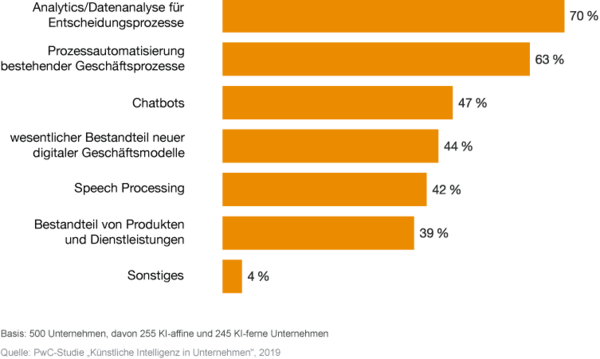Economics and Artificial Intelligence
Be it in production, logistics, marketing or personnel management – AI-assisted applications have already become an integral component of the business world. Robotics (e.g. the Kuka robots), conversation bots (e.g. Alexa) and data analytics (e.g. Amazon’s ML service), to name only a few possible applications of AI, are changing the framework conditions of economic activity for companies, their staff, and their customers.
Research Focus
Starting with operations research back in the 1960s, the first application areas of AI to support management decisions, process control and automation have continually been examined, tested and frequently discarded once again. However, it was the rapidly increasing processing power and data availability in combination with new database technologies, devices and broadband internet that created the right framework conditions for the former laboratory experiments to be repeated under real-life conditions, further developed into marketable applications, products and services, and exploited as such.
The consulting firm PricewaterhouseCoopers (PwC) conducted a survey among 500 German companies in 2019 regarding their most relevant application areas for AI:
Source: PricewaterhouseCoopers, 2019. Study: “Künstliche Intelligenz in Unternehmen“ (artificial intelligence in companies) [WWW document]. PwC. URL: https://www.pwc.de/de/digitale-transformation/kuenstliche-intelligenz/kuenstliche-intelligenz-in-unternehmen.html (accessed 30/06/21).
AI promises a more efficient use of resources and a considerable improvement of operational, economic and social control. However, this is offset by far-reaching rationalisation effects on the part of employees and the danger of a surveillance capitalism in which the human is reduced to a production factor that is measured and classified by her or his contribution to the system.
Questions arising in the context of economic utilisation can be discussed along five problem dimensions:
- The bias problem: the dependence of the analysis results on the quality of the underlying data basis
- The fairness problem: the dependence of the results on the analysis method
- The blackbox problem: the analysis process’ lack of transparency and traceability
- The confidence problem: the (justified) acceptance of, scepticism towards and rejection of AI in the context of its utilisation
- The access problem: the (un)intended preferential or discriminating treatment of certain groups of people in accessing AI
You want to know more? Feel free to ask!
Institute for Innovation Systems
Department of Digital Business and Innovation


